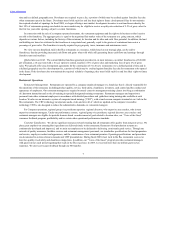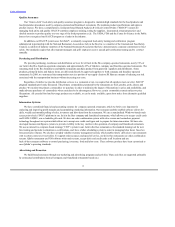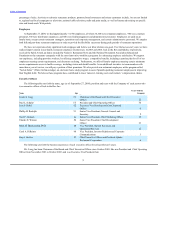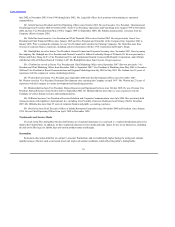Jack In The Box 2009 Annual Report Download - page 16
Download and view the complete annual report
Please find page 16 of the 2009 Jack In The Box annual report below. You can navigate through the pages in the report by either clicking on the pages listed below, or by using the keyword search tool below to find specific information within the annual report.
Table of Contents
Risks Related to Government Regulations. See also “Item 1. Business — Regulation.” The restaurant industry is subject to
extensive federal, state and local governmental regulations. The trend of increasing the amount and complexity of regulations, including
regulations relating to the preparation, labeling, advertising and sale of food and those relating to building and zoning requirements may
increase both our costs of compliance and our exposure to claims of violation of law. The Company and its franchisees are also subject to
licensing and regulation by state and local departments relating to health, sanitation and safety standards, liquor licenses, and laws
governing our relationships with employees, including work eligibility requirements. Changes in, or failure to comply with these laws and
regulations could subject us to fines or legal actions. See also “Risks Related to Increased Labor Costs” above. We are also subject to
federal regulation and certain state laws, which govern the offer and sale, termination and renewal of franchises. Many state franchise
laws impose substantive requirements on franchise agreements, including limitations on noncompetition provisions and on provisions
concerning the termination or nonrenewal of a franchise. Some states require that certain materials be registered before franchises can be
offered or sold in that state. The failure to obtain or retain licenses or approvals to sell franchises could adversely affect us and our
franchisees. We are subject to consumer protection and other laws and regulations governing the security of information. The costs of
compliance, including increased investment in technology in order to protect such information, may negatively impact our margins.
Changes in, and the cost of compliance with, government regulations could have a material adverse effect on our operations.
Risks Related to Computer Systems and Information Technology. We rely on computer systems and information technology to
conduct our business. A material failure or interruption of service or a breach in security of our computer systems could cause reduced
efficiency in operations, loss of data and business interruptions, and significant capital investment could be required to rectify the
problems. In addition, any security breach involving our point of sale or other systems could result in loss of consumer confidence and
potential costs associated with consumer fraud.
Risks Related to Interest Rates. We have exposure to changes in interest rates based on our financing, investing and cash
management activities. Changes in interest rates could materially impact our profitability.
Risks Related to Availability of Credit. To the extent that banks in our revolving credit facility become insolvent, this could limit
our ability to borrow to the full level of our facility.
Risks Related to the Failure of Internal Controls. We maintain a documented system of internal controls, which is reviewed and
monitored by an Internal Controls Committee and tested by the Company’s full time Internal Audit Department. The Internal Audit
Department reports to the Audit Committee of the Board of Directors. We believe we have a well-designed system to maintain adequate
internal controls on the business, however, we cannot be certain that our controls will be adequate in the future or that adequate controls
will be effective in preventing errors or fraud. If our internal controls are ineffective, we may not be able to accurately report our financial
results or prevent fraud. Any failures in the effectiveness of our internal controls could have a material adverse effect on our operating
results or cause us to fail to meet reporting obligations.
Environmental Risks and Regulations. As is the case with any owner or operator of real property, we are subject to a variety of
federal, state and local governmental regulations relating to the use, storage, discharge, emission and disposal of hazardous materials.
Failure to comply with environmental laws could result in the imposition of severe penalties or restrictions on operations by governmental
agencies or courts of law, which could adversely affect operations. Accordingly, we have engaged and may engage in real estate
development projects and own or lease several parcels of real estate on which our restaurants are located. We are unaware of any
significant hazards on properties we own or have owned, or operate or have operated, the remediation of which would result in material
liability for the Company. We do not have environmental liability insurance nor do we maintain a reserve to cover such events. In the
event of the determination of contamination on such properties, the Company, as owner or operator, could be held liable for severe
penalties and costs of remediation. We also operate motor vehicles and warehouses and handle various petroleum substances and
hazardous substances, and are not aware of any current material liability related thereto.
Risks Related to Leverage. The Company has a $565.0 million credit facility, which is comprised of a $150.0 million revolving
credit facility and a $415.0 million term loan. Increased leverage resulting from borrowings under the credit facility could have certain
material adverse effects on the Company, including, but
15
























